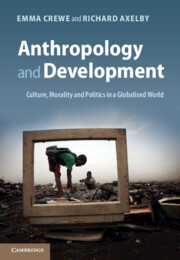Book contents
- Frontmatter
- Contents
- List of acronyms
- Preface and acknowledgements
- 1 Introduction
- 2 Anthropologists engaged
- 3 The social and political organisation of aid and development
- 4 The elusive poor
- 5 Human rights and cultural fantasies
- 6 Hierarchies of knowledge
- 7 The moralities of production and exchange
- 8 The politics of policy and practice
- 9 Imagining the future
- Appendix: challenging questions arising from this book
- Notes
- References
- Index
7 - The moralities of production and exchange
Published online by Cambridge University Press: 05 November 2012
- Frontmatter
- Contents
- List of acronyms
- Preface and acknowledgements
- 1 Introduction
- 2 Anthropologists engaged
- 3 The social and political organisation of aid and development
- 4 The elusive poor
- 5 Human rights and cultural fantasies
- 6 Hierarchies of knowledge
- 7 The moralities of production and exchange
- 8 The politics of policy and practice
- 9 Imagining the future
- Appendix: challenging questions arising from this book
- Notes
- References
- Index
Summary
This chapter examines the notion that development is promoted through integration into national and international capitalist markets. In these terms development is an economic process of global interconnectedness making trade and trade policy vital tools in attaining development objectives. Over much of the past half century international development policy has been premised on a belief in the freedom to pursue individual economic interests as the solution to the problems of poverty and hunger.
Key points covered by this chapter
Contrasting the agricultural producers of developing economies with the financial powerhouses of global capitalism, this chapter examines the distinct positions and perspectives of varied buyers and sellers, producers and consumers.
Recognising markets as more than simple arenas of economic exchange, anthropology traces the social relationships and cultural norms that underpin the workings of markets.
The globalisation of production and exchange is driven by political relationships as much as economic ones; outcomes are shaped by moral, historical and social contexts.
When differing interests and aims are incorporated into global systems of exchange, inequalities can be deepened. We review the possibilities for achieving more equitable impact.
To many policy-makers, development requires the expansion of trade. The argument runs as follows: greater exposure to global competition lowers prices for consumers, promotes specialisation and raises productivity among producers. Inclusion into the expanding global market furthers the diffusion of new techniques, products, ideas and capital and permits people and nations to trade themselves out of poverty. But the broad narrative of market integration and economic growth may conceal other possibilities. From US$59 billion in 1948, the total volume of good, services and merchandise traded internationally in 2009 was valued at US$12.421 trillion (WTO 2010: 11). The global movement of goods and produce, capital, information, technology and people suggest a world that is increasingly interconnected and interdependent. Yet, over the same time period, Africa’s share of world merchandise exports has fallen from 7.3% to 3.2%. For Central and South America the figures are from 11.3% to 3.8%. Economic globalisation is clearly progressing more quickly in some regions than in others. However, statistics are malleable. The champions of economic globalisation still present the history of global exchange and consumption as an inevitable progression towards greater interdependence and shared prosperity.
- Type
- Chapter
- Information
- Anthropology and DevelopmentCulture, Morality and Politics in a Globalised World, pp. 157 - 182Publisher: Cambridge University PressPrint publication year: 2012



